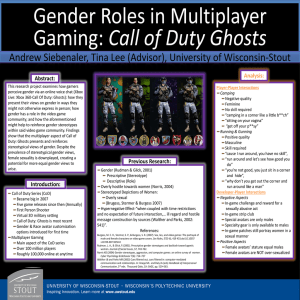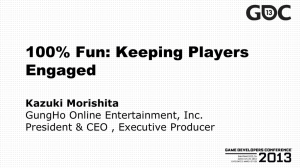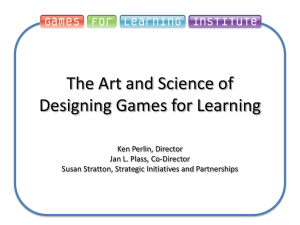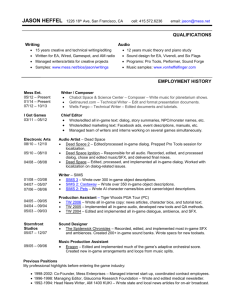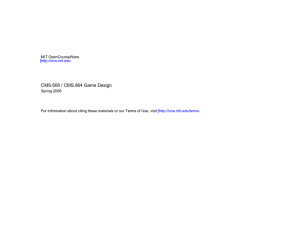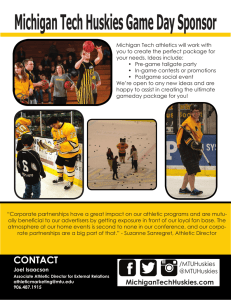CONDITION ECHO BLUESHIFT October 12, 2007 Rules and Scenario
advertisement
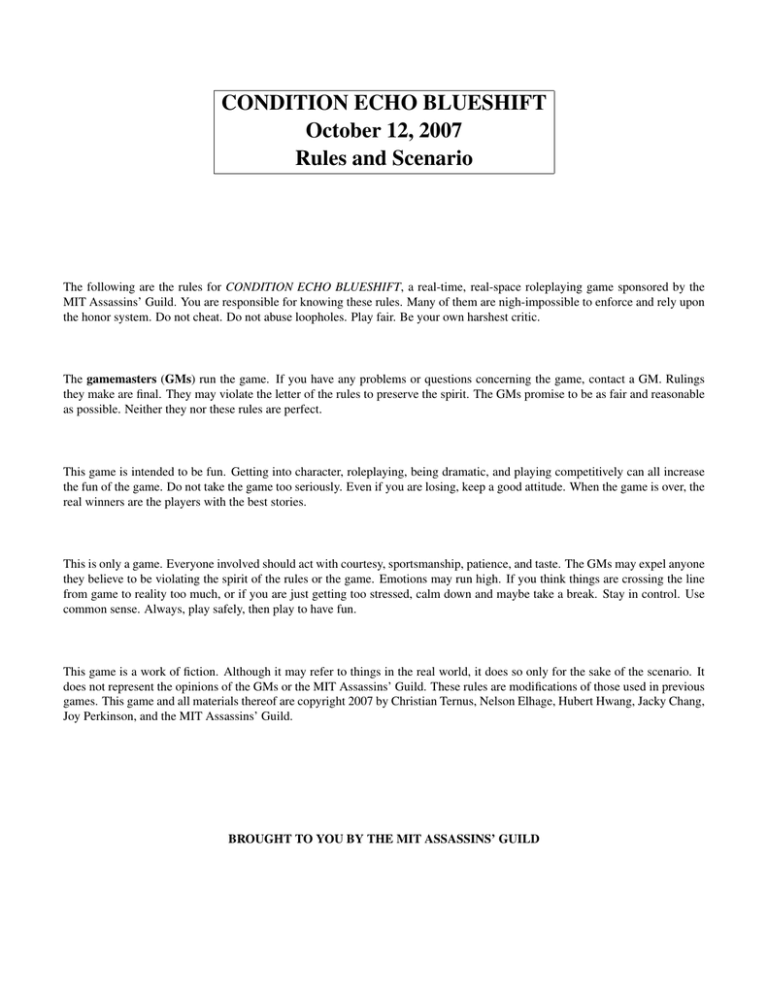
CONDITION ECHO BLUESHIFT October 12, 2007 Rules and Scenario The following are the rules for CONDITION ECHO BLUESHIFT, a real-time, real-space roleplaying game sponsored by the MIT Assassins’ Guild. You are responsible for knowing these rules. Many of them are nigh-impossible to enforce and rely upon the honor system. Do not cheat. Do not abuse loopholes. Play fair. Be your own harshest critic. The gamemasters (GMs) run the game. If you have any problems or questions concerning the game, contact a GM. Rulings they make are final. They may violate the letter of the rules to preserve the spirit. The GMs promise to be as fair and reasonable as possible. Neither they nor these rules are perfect. This game is intended to be fun. Getting into character, roleplaying, being dramatic, and playing competitively can all increase the fun of the game. Do not take the game too seriously. Even if you are losing, keep a good attitude. When the game is over, the real winners are the players with the best stories. This is only a game. Everyone involved should act with courtesy, sportsmanship, patience, and taste. The GMs may expel anyone they believe to be violating the spirit of the rules or the game. Emotions may run high. If you think things are crossing the line from game to reality too much, or if you are just getting too stressed, calm down and maybe take a break. Stay in control. Use common sense. Always, play safely, then play to have fun. This game is a work of fiction. Although it may refer to things in the real world, it does so only for the sake of the scenario. It does not represent the opinions of the GMs or the MIT Assassins’ Guild. These rules are modifications of those used in previous games. This game and all materials thereof are copyright 2007 by Christian Ternus, Nelson Elhage, Hubert Hwang, Jacky Chang, Joy Perkinson, and the MIT Assassins’ Guild. BROUGHT TO YOU BY THE MIT ASSASSINS’ GUILD Contents CONDITION ECHO BLUESHIFT / October 12, 2007 1 Rules and Scenario Scenario “If the world contains things that. . . even the dark is afraid of, then you can bet that there’ll be a secret government agency covering them up for our own good.” – Ken MacLeod, in the foreword to The Atrocity Archives CONDITION ECHO BLUESHIFT is set in the present day. The game action takes place in a seaside training centre located in the hidden town of Dunwich. CONDITION ECHO BLUESHIFT is based on the Bob Howard series of novels by Charles Stross. “I’ve suffered for my knowledge, and here’s what I’ve learned. I could wibble on about Crowley and Dee and mystics down the ages but, basically, most self-styled magicians know shit. The fact of the matter is that most traditional magic doesn’t work. In fact, it would all be irrelevant, were it not for the Turing theorem–named after Alan Turing, who you’ll have heard of if you know anything about computers. That kind of magic works. Unfortunately. . . This. . . is just slightly less dangerous than allowing nerds with laptops to wave a magic wand and turn them into hydrogen bombs at will. Because, you see, everything you know about the way this universe works is correct–except for the little problem that this isn’t the only universe we have to worry about. Information can leak between one universe and another. And in a vanishingly small number of the other universes there are things that listen, and talk back–see Al-Hazred, Nietzsche, Lovecraft, Poe, et cetera. The many-angled ones, as they say, live at the bottom of the Mandelbrot set, except when a suitable incantation in the platonic realm of mathematics–computerised or otherwise–draws them forth. (And you thought running that fractal screen-saver was good for your computer?) Oh, and did I mention that the inhabitants of those other universes don’t play by our rule book? . . . Which is why we have the Laundry. . . ” – Bob Howard, computational demonologist The secret organization known as the Laundry has been operating deep within the British government for years, under classified cover so deep you’d need a bathyscape to reach it. Their job: protecting our world (and our universe) from the gibbering, ravening horrors from beyond the stars. The Laundry (and its counterpart organizations in other countries, notably including the darker organization the Black Chamber in the United States) are responsible for managing contact with the few non-human races that live on Earth, repulsing occult incursions and possessions, and, most importantly, concealing from the world the fact that these threats exist. For the last half-century, the Laundry (representing the United Kingdom and the European Community) has successfully maintained a peace treaty with an ancient race of undersea dwellers codenamed POSEIDON ALPHA. For the security of the human race, the existence of these creatures (known in some old legends as the Deep Ones) has been kept a closely guarded secret. Plans had been in place for a diplomatic meeting between POSEIDON ALPHA and the Laundry for several years. This was supposed to have been a fairly straightforward meeting. However, ten days ago, a splinter race of the Deep Ones, (hastily codenamed VARUNA NINE) appeared on the scene. Revealing themselves as distant relatives of POSEIDON ALPHA, they announced their intention to reveal their existence to the world and seize control of key British shipping lanes if they were not allowed a seat at the negotiation tables. Despite the British government policy of not negotiating in this fashion, the Laundry has the authority to make exceptions when paranormal entities are involved, and has invited them to the treaty summit. This override authority is known as CONDITION ECHO BLUESHIFT. Not everything is right in Dunwich Training Centre. Strange things have been happening around the base, and odd shadows have been spotted lurking in corners. You had all best be on your guard. . . 1 CONDITION ECHO BLUESHIFT / October 12, 2007 2 2.1 Rules and Scenario Getting Started Character Packets Your character packet is a big manila envelope. It contains your role: who you are, what you’re up to; everything about your part as a player-character (PC) in the game. Read all the contents and generally keep them with you during the game. If you are missing something or find something which doesn’t seem to belong to you, tell one of the GMs. Character packets are confidential. Game materials which cannot be given to other players are marked “Not Transferable,” whereas things which can be given to others are marked “Freely Transferable” or “Game Item.” Name-Badge: A name-badge with your player name, character description, and badge number on it shows that you are in the game; wear it visibly while you are playing. It represents your character’s body in-game. Badge numbers are not in-game information. See the Character Bodies and Badge Numbers sections for more details. Character Sheet: Your character sheet describes who you are and what you are up to. It contains a list of everything else that should be in your character packet. Do not show or read your character sheet to other players. Bluesheets: A bluesheet describes information common to members of a group. When in conflict, character sheet information overrides bluesheet information. Do not show or read a bluesheet to other players. Greensheets: A greensheet describes and expands abilities, mechanics, or in-game knowledge. Do not show or read a greensheet to other players. Stat Card: Your stat card lists your statistics. You might not know what all of your stats mean. Do not show your stats to others. The reverse side is a death report; fill it out and give it to the GMs when your character dies. Ability Cards: An ability card explains a special ability your character has. The front side describes the effects; show it to players when you use the ability. The reverse is the rules of use and must not be shown to other players. Memory/Event Packets: A memory packet is an envelope or stapled piece of paper with a trigger which describes when to open and read it. If the trigger is a number, open the packet when you see something with that number. If it’s a quoted phrase, open when you hear or read it in-game. If it’s a symbol, open when instructed. Do not take game action based on an unopened trigger. Do not show or read a memory packet to other players. Items: In-game items may be transferred from character to character, and should be marked as such. See the Items Etc. section for more details. 2 CONDITION ECHO BLUESHIFT / October 12, 2007 2.2 Rules and Scenario Reality and Game Reality There is a big difference between reality and game reality. Players must treat each other with courtesy and explain to each other what their characters perceive in confusing situations; e.g. “My character’s hands are covered in blood,” an out-of-game statement. Characters are under no such restrictions, and may do what it takes to further their goals; e.g. “Uh, hi Bob. Just got back from the butcher shop,” an in-game statement. Metagaming is inferring in-game knowledge that is inappropriate for your character from out-of-game information. Do your best to not metagame and especially to prevent the risk of metagaming. Be your own harshest critic. Halts: A halt pauses game action. To call one, say “game halt” in a clear and audible voice; other players around a corner should hear you, but you shouldn’t scare some poor grad student. End a halt by saying “three, two, one, resume.” Call a halt for one of only three reasons: because a rule instructs you to, for safety and similar out-of-game issues, or to pause game and fetch a GM (which you should avoid). Not-Here: You may go not-here by turning your name-badge around so the “I’m Not Here” side is showing (or by removing your badge entirely, if you are leaving game). Putting a hand on your head, visible from a distance, helps if you’re near other players. Go not-here for one of only three reasons: because a rule instructs you to, to leave game, or to fetch a GM while in a halt (which you should avoid). When you are not-here, your character is not there. Your character cannot see, hear, or remember any game actions or information you (the player) happen to encounter. Avoid other characters, common game areas, game signs, or any sort of game interaction. Non-Players: Use tact and common sense when dealing with non-players (NPs). You are encouraged to spread the gospel of real-time, real-space roleplaying; however, many NPs prefer to sleep, study, or work undisturbed. NPs may not knowingly affect the game. They and their rooms may not be used to hold items or information. They may not help you kill. Do not use the presence of NPs to hide from rampaging mobs that want your blood. Avoid conspicuous or threatening game actions in front of NPs. Shooting your friend outside of a classroom one minute before class lets out is a bad idea, as is screaming bloody murder down a hallway. If, despite your most valiant efforts, some NPs do get upset, call the GMs who will help calm them down. Observers: An observer is someone not playing the game who has agreed to watch. They generally wear an observer headband or an observer name-badge. Observers have traditionally been called “ghosts.” They should stay out of the way; you can always ask an observer to leave. If a friend who is not playing wants to observe game, send them to the GMs. Non-Player-Characters: Non-player-characters (NPCs) are characters in the game’s universe not played by a full-time player. They are minor characters, bit parts, or random people. Some may have name-badges; sometimes called “GM plants,” these are often not readily distinguishable from PCs. 3 CONDITION ECHO BLUESHIFT / October 12, 2007 Rules and Scenario Mechanics: Many actions your character can take, such as walking, talking, and general interaction with other characters, are represented by you doing them. Others, like combat, are performed via abstract mechanics, which are described in ability cards, greensheets, and rules. The abstract information for mechanics (like badge numbers) may not be discussed in-game. If you want to do something special for which there is no mechanic, ask a GM. Become familiar with your mechanics before game starts, especially those which occur under time-pressure (like combat). Game action will not stop for memory packets, greensheets, or such. A kludge (and derivative forms like “kludge-ite”) is something impervious to logic and cleverness, usually for game-balance. You can’t affect a kludge without a specified mechanic. Zone of Control (ZoC) is a rough distance measurement. You are within ZoC of someone if your outstretched fingers can touch their outstretched fingers. Double-ZoC is twice this distance, triple-ZoC is three times, etc. Headbands represent obvious visual effects; wear them visibly on your head. If you see a headband and don’t know what it represents, ask. If you are wearing a headband, tell people what their characters see. Safety: This is a game. Real violence is unacceptable. Game action should cause no real-world damage, either to people or property. If something dangerous is happening, call a halt. Stay in control, use common sense, and do not endanger yourself or others. You should not run or otherwise force your way into or through someone else’s ZoC, and you should not make physical contact with another player without permission. 2.3 Basic Strategy Make sure you understand the rules. If you are completely confused, get a GM who will try to help you out. Make sure you know enough about your character to role-play him or her when you start talking to other people. Read through your entire packet a couple of times, and skim through it again right before game starts. If you don’t know something about your character, ask a GM. As a character, your first priority should be to open lines of communication. Contact people, show up at meetings, and chat. Try to be easy to get in touch with. Ask people questions on relevant subjects. They’ll probably lie, but you may find something out. There are no guarantees that you can trust anyone, but since cooperation is the key to accomplishing things, you will be forced to trust people anyway. The most trustworthy people are probably those who need you. 4 CONDITION ECHO BLUESHIFT / October 12, 2007 3 Rules and Scenario Items Etc. Many in-game items are represented by little white cards with a number and description. Item cards may be shown to others, passed around, stolen, etc. The item number on the card is not in-game information and may not be discussed. Not all in-game items have cards or numbers; whatever they are represented by should be clearly marked “in-game item” or “freely transferable.” Use common sense. You can’t carry a hundred rocks in your pocket, fold a sword in half, or hide a life-sized statue in a fire hose. You can’t stop a bullet with a set of blueprints or rip apart a metal safe with your bare hands. Even if your bag can carry a shovel in it, the shovel noticeably sticks out (“you see a shovel sticking out of my bag”). Written Information: If you write in-game information down on a piece of paper, that paper is now an in-game item and must be clearly marked as such. Don’t write in-game information on out-of-game documents (character sheet, etc.). Don’t write out-of-game information (like memory packet triggers) on in-game documents. Envelopes: Some items and locations may have an attached envelope (or just be a labeled packet or folded paper). The envelope may include directions for when to open these (“open packet if you press the big red button” or “open packet if you eat this”); otherwise you may only open them if instructed. Close them when you are done. Open and close packets gently. Signs: Some locations and other game materials are represented by signs or packets posted throughout game area. You may read any signs and must follow any rules printed on them. If a sign or packet doesn’t have some sort of in-game description (it only has out-of-game mechanics information, like a number or just a colored dot), then your character doesn’t even see it or know that anything unusual is there. Bulkiness: A bulky item is too big or heavy to be carried or concealed freely. Bulkiness is measured in hands or dots (how many hands it takes to carry it). If you are carrying a bulky item, make it clear to onlookers (hold the card). A hand carrying a bulky object may do nothing else. With one hand less than required, you may drag a bulky item at a slow pace. Props: Some items may have props (physical representations or physreps) associated with them. The card and physrep should be kept together. If they are separated, the card is the real item. Prop items are as bulky as the physrep. They can be carried in bags that can hold them, on straps that are attached to them, etc. Containers: Some items, like crates or personal bags, have a capacity. Capacity is measured in dots or hands; this is how many dots of items can be stored within. You can put as many non-bulky items inside as is within reason. A container may have a capacity bigger than its bulkiness; use common sense when nesting containers. Put contained item cards inside the envelope attached to the container card. Character Bodies: A body is two hands bulky and usually represented by a name-badge. It must be willing or unable to resist for you to carry it. Carry the badge conspicuously. Onlookers can’t tell if it’s dead without close examination, unless it would be obvious (like headless). 5 CONDITION ECHO BLUESHIFT / October 12, 2007 3.1 Rules and Scenario Searching, Stashing, and Stealing Places: To search a place, search it. Normal items can be stashed in any reasonable, legal place. Don’t put items behind locked doors, inside ceilings, in construction sites, or in hacking locations; consequently, don’t go rummaging through such places for game items. Don’t stash or search in places that are not in-game; see the Game Areas section for more information. People: All searches of characters or their belongings are conducted via player dialogue. Someone must be willing or unable to resist for you to search them. You need at least one free hand to search someone. Anyone within ZoC of either you or your victim can prevent the search by saying “I stop you” or an equivalent phrase. You can perform a pat-down search, which will only reveal the presence of weapons. This takes as much time as it takes your victim to tell you what you find. If you’re the victim, do this at a reasonable pace. A total search is an invasive, complete search of a character’s clothing. This reveals all in-game items, and takes as long as your victim spends handing over possessions. If you’re the victim, hand over items at a reasonable pace. Bags: To search a bag in someone’s possession, say “I search your bag.” This proceeds just as a total search. To search a bag that is obviously in-game (has an attached, displayed item card), search the physrep. Item cards in the bag must be in reasonable places. If the item card has a capacity and an envelope, the bag is just a prop and all in-game items should be in the packet. To search a bag that is not obviously in-game (no visible item card attached), spend thirty seconds by the bag, put a “searched (see a GM)” note on the bag, and come tell a GM. Tell any onlookers that they see you searching through the bag. Search an attended bag via player dialog with the owner; they must be willing or unable to resist. If someone searches a bag you are holding, hand over all game items inside at a reasonable pace. If you find a “searched” note on your bag, come see a GM. To declare a bag out-of-game, label it “no game items.” 6 CONDITION ECHO BLUESHIFT / October 12, 2007 4 4.1 Rules and Scenario Violence, Damage, and Death Health States Characters have five possible states, concerning health and damage. When you are fine, you may act freely. When you are restrained, you are helpless and may do nothing but talk. When you are knocked out, you will wake up in five minutes. When you are wounded, you are unconscious, bleeding, and will die in five minutes. When dead, you are dead. When knocked out or wounded, fall down and drop anything you are holding. Just lie there. You won’t be doing much of anything until you wake up. Do not listen to conversations going on. Dead men tell no tales. If dead, do not give out any information about your character or death to any players. You may remain on the scene to play the part of your corpse; describe obvious information to onlookers (“I have a gunshot wound in my back”). When you leave, place the front of your name-badge with a description of the body’s obvious state. Take the “I’m Not Here” side to wear. Stack your items with your body. Fill out your Death Report. Make sure the GMs know about your death. If your death becomes generally known to the other characters, you may be able to become an observer. Until the game is over, you may not convey game information to any player. 4.2 Weapons All weapons have both a physrep and an item card; keep these together. Weapon effects are on the card. To use a weapon, you must have it in your hand and unobstructed. Display it in an obvious manner. You cannot hold more than one weapon in a hand. You may only use one melee weapon at a time. 4.3 Killing Blow A killing blow will kill a helpless victim. Your victim must be within ZoC and either unconscious or restrained. You must use a weapon (melee or ranged). Clearly incant “killing blow one, killing blow two, killing blow three” at a reasonable pace. During the incant, if you are attacked or if someone within ZoC says “I stop you” or an equivalent phrase, you are stopped. To stop a killing blow, either attack the person doing it or say “I stop you” within ZoC. 4.4 Ranged Combat Ranged combat is real-time and mostly based upon player skill at firing and dodging physreps. Keep it safe. Hits to anywhere on the body count the same; don’t aim for the head. If a projectile hits clothing or long hair such that it would not hit the body when passing through, it doesn’t count. Hits to an item you hold count as a hits on you, not the item. If there is a conflict over whether or not a projectile hit, the shooter calls the shot. There are three kinds of ranged projectiles in game: bullets, taser blasts, and weirdshit attacks. If you are hit by a taser, (physrepped by a patrol dart gun), you become knocked-out. A bullet (represented by a plastic disc) will cause you to become wounded. A spell packet typically represents a weirdshit attack by demonic forces – see the section on Sanity. 7 CONDITION ECHO BLUESHIFT / October 12, 2007 4.5 Rules and Scenario Martial Combat All characters have a Combat Rating (CR) stat. This represents your basic skill in martial combat; you use the same number for attacking and defending. Someone with a CR of one can’t fight very well. Someone with a CR of three is somewhat burly or skilled. When using this stat, you may pull your punches by using a lower number. To martial-attack someone, clearly state your attack and CR (“Knock Out 2”, “Wound 2”, etc.) from within ZoC. You need the ability card for any attack you make; you don’t have to display it. Your attack must resolve before you make another; otherwise, you may act freely. If an ally directs Assist at you after you attack, you may, within 2 seconds, restate your attack with the Assist’s CR added (“Wound 3”, “Assist 2”, “Wound 5”). Assist does not change your CR for defense. You may ignore an Assist. When martial-attacked, resolve by comparing the attack against your CR. If your CR is lower, take the effects; else, say “resist” and the attack has no effect. If you neither say “resist” nor state your own attack within two seconds of the incant’s end, you are surprised and the attack just works. The attack begins when the incant begins; until you resolve, all of your actions other than martial attacks are interrupted; serial attacks don’t prevent simple actions (talking, weapon-drawing, ranged attacks) in-between. Resolve all attacks alone, in the order they occur; choose the order if it is unclear. If you are attacked with “waylay” instead of a CR (“Knock Out waylay”), the attack just works. Martial Attack Abilities: Here is a list of attack abilities. Everyone has Knock Out, Wound, and Assist. Other attack abilities may exist. Knock Out: You can knock someone out as an attack. This requires a blunt weapon. Say “Knock Out” and your CR. Effect: I knock you out. Wound: You can wound someone as an attack. This requires an edged weapon, such as a knife. Say “Wound” and your CR. Effect: I wound you. Assist: You can assist someone else’s attack. You must be within ZoC of both the attacker and target. Within two seconds of an attack, direct this at the attacker, saying “Assist” and your CR. Effect: I assist your attack. 4.6 Sanity In case you haven’t caught on, yet, this is a Lovecraft/Cthulhu game, even if it’s a sci-fi one. As such, since we are dealing with Things Man Was Not Meant To Know, there is indeed a sanity mechanic in game. (Nearly) every character in game has a sanity score, ψ. A positive score means that your sanity is fine, and your average Joe will have a sanity of 4 or so. If your score ever reaches 0, you are reduced to gibbering insanity until someone or something fixes you. Interpret as you will – “roleplay accordingly” – but a character in this state should be obviously off their rocker, and too incoherent to communicate intelligibly, defend themselves from attack, or interact with any nontrivial mechanics. Characters can notice, and therefore stop, people trying to waylay them. If someone manages to restrain the character or waylay them, a killing blow can be done as usual, but not before. The character is also still vulnerable to guns/tazers/edged weapons but not to further sanity damage. It should be obvious whether or not you are in this state: While ψ itself is private information, you should answer questions about whether or not it has reached 0. There are several ways for your sanity score to change. If a character throws a spell-packet at you and incants “sanity”, that represents a demon or similarly nasty spirit invading your mind with images too dark for your mind to deal with. If hit by such an attack, reduce your ψ by 2 (to a minimum of 0), and, if your ψ is still positive, remain frozen to the spot shaking in terror for one minute, during which you are immune to further attacks. There will be characters in game who have the ability to cure insanity or to improve the sanity of already-sane characters. They will know who they are and how to do so. 4.7 Stealth Stealth abilities represent sneaking up on a victim with obvious intent to invade their personal space, probably to attack them by surprise or to pick their pocket. 8 CONDITION ECHO BLUESHIFT / October 12, 2007 Rules and Scenario To use a stealth ability, you must be within ZoC of your victim. Form the sign of the devil (index and pinky fingers extended, thumb holding other two fingers down) and extend it along the direct, unobstructed line from your shoulder to the victim’s head. Hold this position for the time specified by your ability. Before this time is up, the ability is thwarted if anyone attacks you or if the victim notices the symbol. If they react in any way to the symbol, they have noticed; you (the attacker) make the call. If you notice someone using a stealth ability on you, make it obvious. “I notice you” is unambiguous; use it if you can. Once a stealth ability is finished, you may not retroactively have noticed. Waylay: You can attack by surprise as a stealth ability. You must hold the symbol for five seconds. If you succeed, you may replace your CR with “waylay” for a single immediate attack on your victim. 9 CONDITION ECHO BLUESHIFT / October 12, 2007 5 Rules and Scenario Miscellaneous Headband Colors: A white or yellow headband represents an observer. A purple headband represents a demon – these are insubstantial and generally cannot be affected by normal combat. Badge Numbers: The first digit of your badge number is your character’s apparent age in decades. The second digit of your badge number is your character’s bulkiness in dots. Most bodies are 2 dots bulky. The third digit of your badge number is a descriptive number that identifies you from other people your age and size. If you are male, it is odd, and if you are female, it is even. Combat: To clarify, the only combat abilities usable while unarmed are Knock Out, Assist, Restrain, and disarm, unless you know otherwise. An unarmed person may Assist an armed person making a Wound attack. “Rope”: Cat-5 cable is freely available. Make an item card for it. To tie someone up, they must be either willing or helpless. If you get tied up with Cat-5, you become restrained. If you are conscious and left alone, you can wriggle free in five minutes. 6 Game Information Game Times: Game runs from 4pm to 8pm on Sunday, July 29. Please be in 34-3 a half hour early. If we hear nothing from you, we may give your packet to somebody on our waitlist at 3:50pm. We also suggest that you arrive an hour early to set up and get in character. Surviving PCs are expected to be in-game for the entirety. Game may end early. Cleanup and Wrapup will immediately follow the end of game. TODO: GAMETIME :TODO Game Areas: Game takes place on the third floor of buildings 34, 36, and 24, and the first floor of buildings 36, 34, and 38. In-game rooms will be labelled as such. The stairwells that connect the first and third floors of buildings 36, 38, and 24 are in-game. Elevators are not in-game. As usual, avoid places it is illegal for you to go, areas under construction, etc. Don’t take game actions in bathrooms, private offices, and other places not all players would be allowed to enter. Nothing outside is in-game. Game action is not allowed in Athena clusters. Don’t hide in them, either. You may not use Athena or phones for any in-game purpose. The GM Control Room is room 34-302. You may leave personal items with the GMs. Publically Known Game Locations - Conference Room - 34-301. Negotiations will be held here. - Laboratories - 36-372, 36-153, 24-307, and 38-166. - Ocean - north of the black metal pillars in 34-1. 7 Closing Notes These rules are imperfect. The GMs may violate the letter of the rules to preserve the spirit. We hope these rules are reasonably clear, but if you have any doubts about your interpretation, talk it over with us in advance. We should also add, as much as we hate to admit it, we GMs are human: when all of our carefully laid plans are going haywire, we may lose our cool. The best way to deal with people is remaining calm and friendly, especially when everyone is tired and hungry. We hope you have lots of fun. Good luck. - The CONDITION ECHO BLUESHIFT GMs 10
